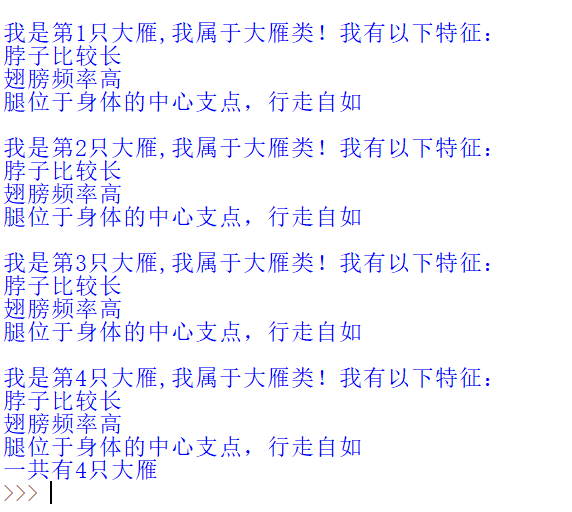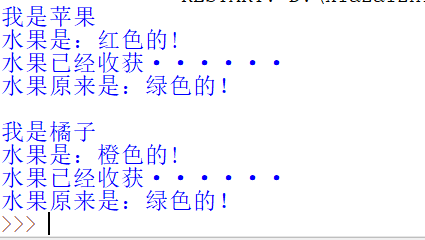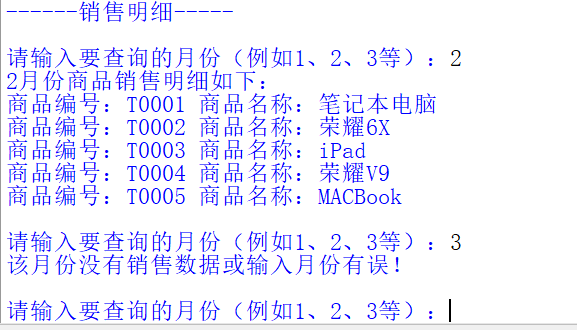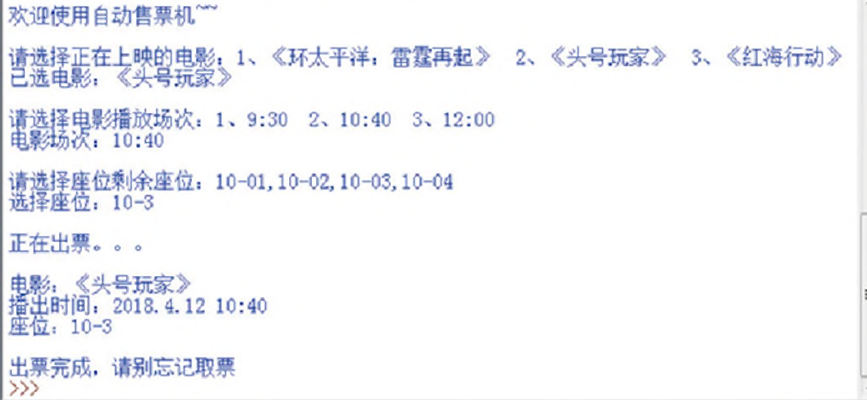第七章
实例01--创建大雁类并定义飞行方法
class Geese: '''大雁类''' def __init__(self,beak,wing,claw): print('我是大雁类!我有以下特征:') print(beak) print(wing) print(claw) def fly(self,state): print(state) beak_1="喙的基部比较高,长度和头部的长度几乎相等" wing_1="翅膀长而尖" claw_1="爪子是蹼状的" wildGoose=Geese(beak_1,wing_1,claw_1) wildGoose.fly('我飞行的时候,一会排成个人字,一会排成个一字')

实例02--通过类属性统计类的实例个数
class Geese: '''雁类''' neck='脖子比较长' wing='翅膀频率高' leg='腿位于身体的中心支点,行走自如' number=0 def __init__(self): Geese.number+=1 print('\n我是第'+str(Geese.number)+'只大雁,我属于大雁类!我有以下特征:') print(Geese.neck) print(Geese.wing) print(Geese.leg) list1=[] for i in range(4): list1.append(Geese()) print('一共有'+str(Geese.number)+'只大雁')

实例03--在模拟电影点播功能时应用属性
class TVshow: list_film=['战狼','红海行动','西游记女儿国','熊出没·变形记'] def __init__(self,show): self.__show=show @property def show(self): return self.__show @show.setter def show(self,value): if value in TVshow.list_film: self.__show='您选择了《'+value+'》,稍后将播放' else: self.__show='您点播的电影不存在' tvshow=TVshow('战狼') print('正在播放:《',tvshow.show,'》') print('您可以从',tvshow.list_film,'中选择要点播的电影') tvshow.show='红海行动' print(tvshow.show)

实例04--创建水果基类及其派生类
class Fruit: color='绿色' def harvest(self,color): print('水果是:'+color+'的!') print('水果已经收获······') print('水果原来是:'+Fruit.color+'的!') class Apple(Fruit): color='红色' def __init__(self): print('我是苹果') class Orange(Fruit): color='橙色' def __init__(self): print('\n我是橘子') apple=Apple() apple.harvest(apple.color) orange=Orange() orange.harvest(orange.color)

实例05--在派生类中调用基类的__init__()方法定义类的属性
class Fruit: def __init__(self,color='绿色'): Fruit.color=color def harvest(self,color): print('水果是:'+self.color+'的!') print('水果已经收获······') print('水果原来是:'+Fruit.color+'的!') class Apple(Fruit): color='红色' def __init__(self): print('我是苹果') super().__init__() class Sapodilla(Fruit): def __init__(self,color): print('\n我是人参果') super().__init__(color) def harvest(self,color): print('人参果是:'+color+'的!') print('人参果已经收获······') print('人参果原来是:'+Fruit.color+'的!') apple=Apple() apple.harvest(apple.color) sapodilla=Sapodilla('白色') sapodilla.harvest('金黄色带紫色条纹')

实战一:修改手机默认语言
class phone: #定义手机类 '''手机类''' def __init__(self,language='英文'): #构造方法 if language=='英文': print('智能手机的默认语言为'+language) else: print('将智能手机的默认语言设置为'+language) phone() #无参数 phone('中文') #有参数

实战二:给信用卡设置默认密码
class Card: '''信用卡类''' def __init__(self,number,code='123456'): if code=='123456': print('信用卡'+str(number)+'的默认密码为'+str(code)) else: print('重置信用卡'+str(number)+'的密码为'+str(code)) Card('4013735633800642') Card('4013735633800642','168779')

实战三:打印每月销售明细
class SaleHandler: '''销售管理类''' def __init__(self): self.__sale_data = { "2":[('T0001','笔记本电脑'), ('T0002','荣耀6X'), ('T0003','iPad'), ('T0004','荣耀V9'), ('T0005','MACBook')]} #{key:value} def querySaleList(self,query_month): '''根据输入月份,查询商品明细''' if query_month in self.__sale_data: print("%s月份商品销售明细如下:" % query_month) for item in self.__sale_data[query_month]: print("商品编号:%s 商品名称:%s" % item) else: print("该月份没有销售数据或输入月份有误!") print("------销售明细-----") sh = SaleHandler() while True: month = input("\n请输入要查询的月份(例如1、2、3等):") if month == 'quit': break sh.querySaleList(month)

实战四:模拟电影院售票机
class Film: """ 电影类 有三个属性:电影名字 播放场次列表 剩余座位列表 """ def __init__(self,film_name,timelist,seatlist): #构造方法 self.name=film_name self.timeList=timelist self.seatList=seatlist class Ticket: def __init__(self,film,time,seat): self.__film=film self.__time=time self.__seat=seat def __str__(self): return'电影:'+self.__film+'\n放映时间:'+self.__time+'\n座位:'+self.__seat class TicketMachine: def __init__(self): self.__filmList=[Film('《长津湖》',['9:30','10:40','12:00'],['10-01','10-02','10-04']), Film('《战狼2》',['8:30','9:40','11:00'],['2-01','2-02']), Fllm('《红海行动》',['13:30','15:40','20:00','21:15'],['5-01','5-02','5-10','5-12'])] print('欢迎使用自动贩卖机~~') def takeTicket(self): print('\n请选择正在上映的电影:',end='') for index,item in enumerate(self.__filmList): print(index+1,item.name,sep='.',end='') print() inputselect='2' #假设用户输入选择为2 sfilm=self.__filmList[int(inputselect)-1] selectfilm=sfilm.name print('已选电影:'+selectfilm) print('\n请选择电影播放场次:',end='') #遍历选择的电影时间列表,显示全部可选择时间 for index,item in enumerate(sfilm.timeList): print(index+1,item,sep='.',end='') print() inputselect='2' #假设选择了第2个10:40场次 selecttime=sfilm.timeList[int(inputselect)-1] #获取选择时间 print('电影场次:'+selecttime) print('\n请选择座位:',end='') #遍历以选择电影剩余座位,输出全部可选择座位 for index,item in enumerate(sfilm.seatlist): print(index+1,item,sep='.',end='') print() inputselect='2' #假设选择了第2个10-02 selectseat=sfilm.seatList[int(inputselect)-1] #获取座位号 print('选择座位:'+selectseat) #模拟出票 print('\n正在出票......\n') tk=Film(selectfilm,selecttime,selectseat) #输出电影票信息,输出内容的格式是电影票中的str定义的 print(tk) print('\n出票完成,请别忘记取票!')




 浙公网安备 33010602011771号
浙公网安备 33010602011771号